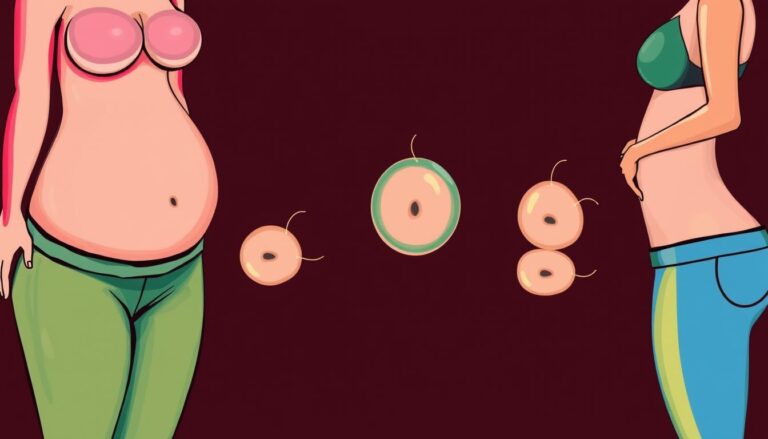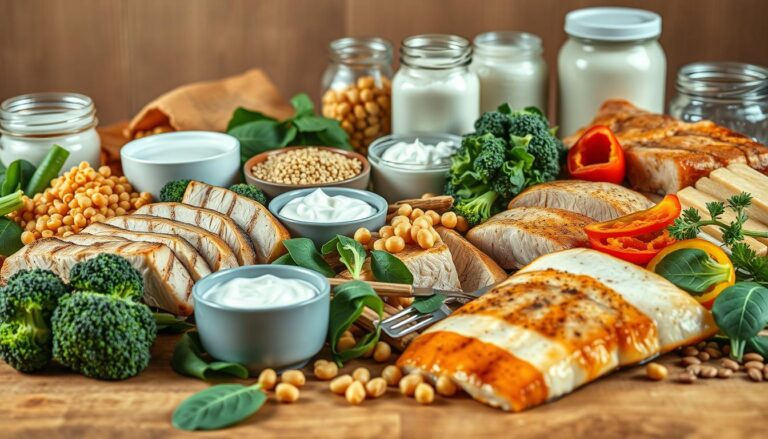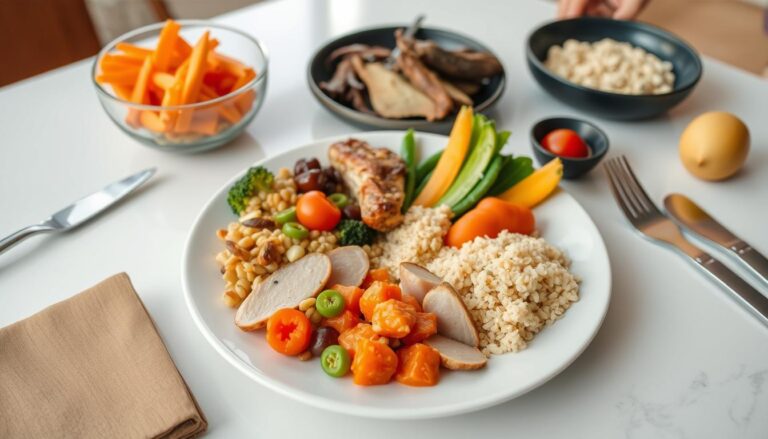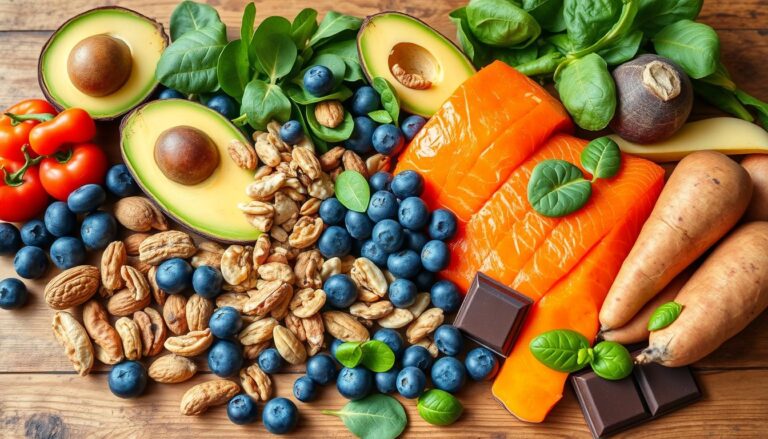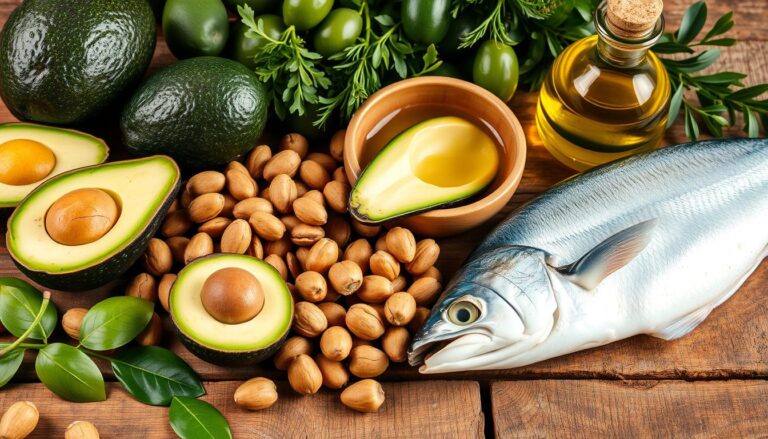How important is your liver’s health, and what dietary choices can make the biggest impact? The liver is a remarkable organ responsible for a wide range of critical functions.
It digests nutrients and filters out toxins. When the liver is compromised the consequences can be severe. But what if there were natural food based solutions to support liver repair and regeneration?
Key Takeaways
- The liver plays a vital role in digestion, metabolism, and detoxification.
- Unhealthy dietary habits can lead to liver damage and disease such as fatty liver and cirrhosis.
- Incorporating liver friendly foods like fruits vegetables whole grains, and healthy fats can help repair and protect the liver.
- Certain superfoods like coffee green tea, and garlic have been shown to have potent liver boosting effects.
- Maintaining a balanced nutrient dense diet and staying hydrated are key to supporting optimal liver health.
Importance of a Healthy Liver
The liver is a vital organ that plays a crucial role in our overall health and well being. It is responsible for many essential functions. These include the digestion and metabolism of nutrients detoxifying harmful substances and regulating various bodily processes.
Liver’s Role in Digestion and Detoxification
The liver’s main job is to turn the nutrients we eat into energy, growth, and repair. It also breaks down and removes toxins and harmful compounds. This helps keep our bodies clean and free from harm.
Consequences of Liver Damage and Disease
When the liver is damaged or diseased, serious health problems can occur. Conditions like cirrhosis liver failure, and even liver cancer can have devastating effects. Maintaining a healthy liver is crucial for overall well-being.
The liver is the only organ in the body that can regenerate itself but it has its limits. That’s why it’s so important to take care of your liver health.
Understanding the liver’s vital role in our bodies and the risks of damage or disease is key. We can support our liver health by making smart dietary choices adopting healthy habits, and seeking medical help when needed.
Dietary Habits for Liver Health
Keeping your liver healthy is key to feeling good. Eating right is a big part of it. Avoid foods with too much fat sugar and salt. Choose a diet that’s full of nutrients instead.
Avoiding Fatty Sugary and Salty Foods
Foods high in unhealthy fats sugars and salts can harm your liver. Stay away from fried foods processed snacks and sugary drinks. These can lead to fatty liver disease where fat builds up in your liver.
Maintaining a Balanced and Nutritious Diet
Eating a balanced diet is important for your liver. Eat lots of fiber fruits, veggies lean proteins, and whole grains. These foods help your liver work better.
- Eat more complex carbs like whole grains for energy.
- Choose high quality proteins like lean meats and fish for liver health.
- Add fruits and veggies rich in antioxidants to protect your liver.
- Drink plenty of water to help your liver detox.
Everyone’s diet needs are different especially if you have liver issues. Talk to a doctor or dietitian to make a diet plan that’s right for you.

What foods are good for liver repair?
Certain foods can help repair and regenerate the liver. Adding these liver-friendly foods to your diet supports liver health. This helps your liver recover and stay strong.
Fiber-Rich Foods Like Oatmeal and Leafy Greens
Foods high in fiber, like oatmeal and leafy greens aid digestion. This makes it easier for the liver to work well. Oatmeal helps control blood sugar and supports liver health.
Leafy greens, such as spinach and kale, are full of fiber and antioxidants. These protect the liver from harm.
Antioxidant-Packed Fruits and Vegetables
Eating a variety of fruits and vegetables rich in antioxidants is good for the liver. Berries like blueberries and cranberries are full of polyphenols. These help reduce liver damage.
Broccoli bell peppers, and tomatoes are also great choices. They contain carotenoids and vitamin C, which protect the liver.
Eating these liver-repairing foods regularly helps your liver detox and stay healthy. A balanced diet is essential for liver health and liver repair.
Coffee A Surprising Liver Friendly Beverage
Many think coffee is bad for the liver but it might actually help. Studies show that drinking coffee even decaf or instant can lower liver disease risk. This includes serious liver problems.
Coffee’s liver benefits come from antioxidants and anti-inflammatory compounds. It’s a big source of antioxidants for many, even more than fruits and veggies.
Research shows coffee is good for the liver. A 2015 study found green tea drinkers had a 32% lower liver disease risk. A Brazilian study showed rats with coffee and liver damage had healthier livers.
Coffee does more than just protect against liver disease. It also lowers liver cancer risk. Drinking coffee was linked to a 40% lower risk of liver cancer.
The more coffee you drink the better it might be for your liver. Heavy drinkers who drank 2 cups of coffee a day cut cirrhosis risk by 40%. Drinking 4 cups a day cut it by 80%.
So coffee might be a liver friendly drink. Drinking it in moderation could help prevent and manage liver issues.

Read more: Benefits of Coffee Your Daily Health Boost
Green Tea: A Potent Liver Protector
Green tea is another drink that might help protect the liver. It contains catechins, which can lower liver enzyme levels. But drinking too much green tea extract can harm the liver so be careful.
Catechins and Their Beneficial Effects
The catechins in green tea especially EGCG, have been studied a lot. They might help reduce liver inflammation and damage. This is because they have antioxidant and anti-inflammatory properties.
Drinking 3 to 6 cups of green tea a day could help those with NAFLD. But, it’s important to remember that too much green tea extract can cause liver problems. So, drink green tea in moderation for your liver’s health.
Green tea is a potent liver protector, but it’s important to consume it in moderation, as high doses of green tea extract have been associated with rare cases of liver damage.
While liver damage from green tea is rare it’s good to know the risks. This is especially true for people with liver issues or taking certain medications. Always talk to a doctor before adding green tea to your diet for liver health.
Garlic A Flavorful Ally for Liver Health
Garlic is more than just a tasty ingredient. It’s also good for your liver. Research shows that garlic can help keep your liver healthy.
Garlic is full of antioxidants and anti-inflammatory compounds. These help your liver work better. Studies say garlic can even help with fatty liver disease.
Garlic’s sulfur compounds, like allicin, may also help. They can reduce fat in the liver. This makes garlic a natural way to fight fatty liver disease.

Garlic is a natural treasure trove of compounds that can support liver health and function. Its versatility in the kitchen and potential health benefits make it a must have ingredient for anyone looking to nurture their liver.
While garlic is promising remember to eat well too. A diet full of liver friendly foods is key. Include leafy greens citrus fruits and healthy fats to help your liver.
Berries Powerhouses of Liver-Protecting Polyphenols
Berries are superstars for liver health. They are full of polyphenols, which are antioxidants that protect the liver. Adding more berries to your diet can help keep your liver strong.
Blueberries Cranberries and Beyond
Studies show that berries like blueberries and cranberries can reduce liver damage and inflammation. A 2021 study of about 2,700 adults found a positive correlation between high flavonoid intake from berries and healthy liver function. Anthocyanins the pigments in berries also support liver health.
For example a preclinical animal study found that anthocyanins in purple sweet potatoes supported healthy liver function.
Other berries like blackberries, raspberries, and goji berries also have liver-protective benefits. Eating a variety of these fruits can nourish your liver and improve your overall health.
Berries are powerhouses of liver-protecting polyphenols, making them a simple yet effective addition to any diet aimed at supporting liver health.
| Berry | Polyphenol Content | Potential Liver Benefits |
|---|---|---|
| Blueberries | High in anthocyanins and other polyphenols | May help reduce liver damage inflammation, and fat buildup |
| Cranberries | Rich in proanthocyanidins and other polyphenols | May support healthy liver function and protect against damage |
| Blackberries | High in antioxidant polyphenols | May offer similar liver protective effects as blueberries and cranberries |
| Raspberries | Contain ellagic acid and other polyphenols | May help reduce inflammation and protect the liver |
| Goji Berries | Rich in polyphenols, carotenoids, and other antioxidants | May support overall liver health and function |
Eating a variety of berries is a tasty way to support your liver. Whether you choose blueberries, cranberries, or a mix you’ll get a boost of liver-protecting polyphenols.
Grapes and Grapefruit Nature’s Liver Boosting Treats
Grapes and grapefruit are not just tasty fruits. They also help keep your liver healthy. These fruits have special compounds that support liver health naturally.
Grapes are more than a tasty snack. Their skin and seeds are full of antioxidants like resveratrol. These help protect the liver and reduce inflammation.
Grapefruit has its own liver friendly compounds like naringin. These antioxidants fight inflammation and protect the liver. Eating grapefruit can be a tasty way to support liver health.
Whether you like grapes or grapefruit they’re good for your liver. Adding them to your diet can help keep your liver healthy.
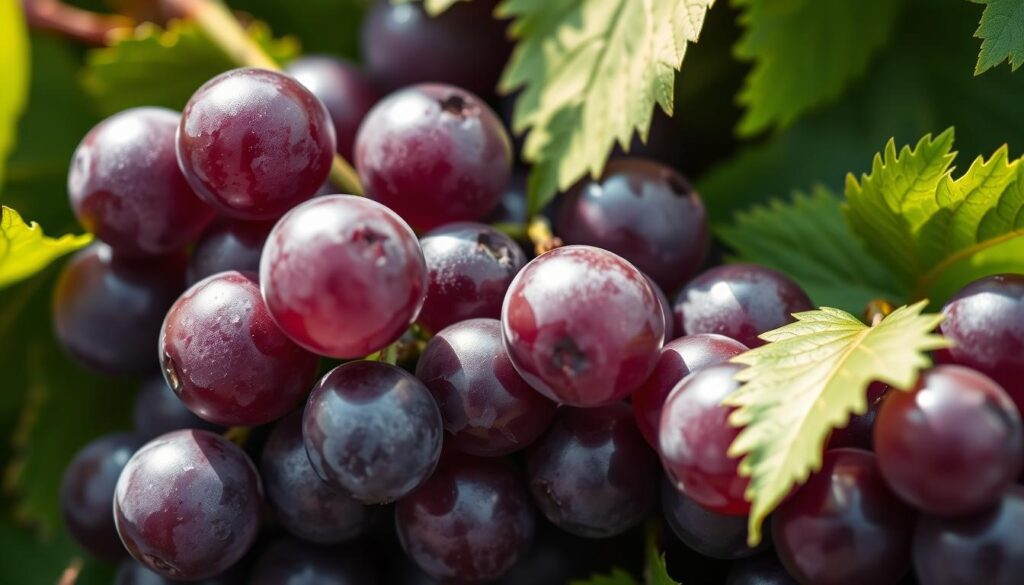
Read more: High Protein Diets Focus on Protein in Food
Eating well, exercising, and staying hydrated also help your liver. Adding grapes and grapefruit to your diet boosts your body’s health.
Prickly Pear An Unconventional Liver Friendly Fruit
The prickly pear fruit is getting attention for its liver health benefits. This colorful fruit comes from a cactus and might help protect and heal the liver studies suggest.
The Opuntia spp. family has over 250 types of prickly pear. These plants are important for food, medicine, and beauty products. Opuntia ficus-indica is the most studied for liver health.
Studies on animals show prickly pear’s benefits for the liver. For example, rats fed Opuntia ficus indica had better liver health. They had less fat in their livers and lower liver enzyme levels.
Vinegar from Opuntia fruit also helped rats’ livers. It reduced liver fat and inflammation. It also lowered liver damage and oxidative stress.
The seeds of Opuntia helped mice’s livers too. They had less liver fat and inflammation. They also had fewer liver damage spots and less oxidative stress.
Dehydrated nopal prickly pear pad helped rats’ livers as well. It reduced liver fat and inflammation. It also lowered blood sugar levels.
More research is needed to know how prickly pear helps humans. But it might be a good addition to a healthy diet. Always talk to a doctor before trying new foods for liver health.
Prickly pear may offer a surprising and unconventional approach to supporting liver health, though more research is needed to fully understand its potential benefits.
Fatty Fish and Nuts Healthy Fats for Liver Support
Fatty fish and nuts are great for a healthy liver. They are full of unsaturated fats like omega-3s which help the liver stay well.
Fatty fish like salmon mackerel, and sardines, are especially good for the liver. They have lots of omega-3s. Studies show these can lower the risk of liver disease and cancer. The antioxidants and other nutrients in these fish also protect the liver.
Nuts are another great choice for healthy fats. Walnuts almonds and cashews are full of unsaturated fats fiber and antioxidants. Eating nuts can help lower the risk of nonalcoholic fatty liver disease NAFLD a common liver problem.
| Nutrient | Fatty Fish | Nuts |
|---|---|---|
| Omega-3 Fatty Acids | High | Moderate |
| Unsaturated Fats | High | High |
| Antioxidants | Moderate | High |
| Fiber | Low | High |
Eating fatty fish and nuts can help your liver a lot. These foods reduce inflammation and protect the liver. They might even help manage liver problems.
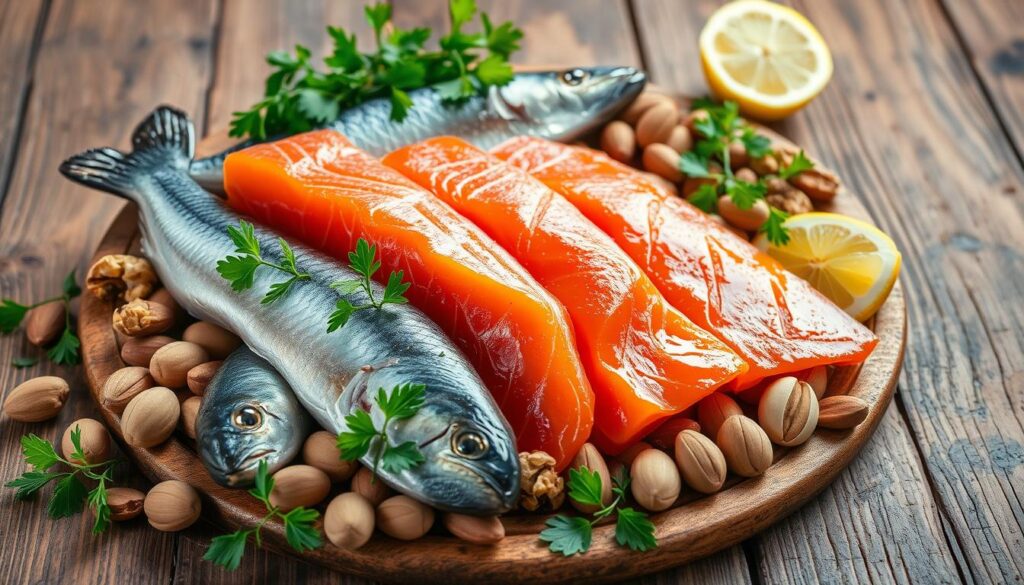
Read more: 5 Foods to Avoid with Fatty Liver
Incorporating fatty fish and nuts into your diet can be a simple yet powerful way to support your liver’s health and function.
Olive Oil A Mediterranean Staple for Liver Wellness
Olive oil is a key part of the Mediterranean diet. It might do more than just taste good it could also help your liver. The unsaturated fats and antioxidants in olive oil might reduce liver stress and improve function. But we need more research to know for sure.
Unsaturated Fatty Acids and Antioxidants
Olive oil is full of monounsaturated and polyunsaturated fats which are better for you than saturated fats. These unsaturated fats could help your liver by lowering inflammation and stress. It also has antioxidants like polyphenols, which protect your liver.
A 2021 study showed that drinking 25 ml of extra virgin olive oil daily for eight weeks helped the liver. It also found that eating olive oil can cut the risk of fatty liver disease by half. This was seen in another study.
Extra virgin olive oil is best for liver health because of its quality. It has lots of monounsaturated and polyunsaturated fats and antioxidants. As a big part of the Mediterranean diet, olive oil shows how good this diet is for your health.
Incorporating olive oil into the diet can reduce the risk of non-alcoholic fatty liver disease NAFLD by up to 50%.
| Olive Oil Benefits for Liver | Relevant Studies |
|---|---|
| Reduced oxidative stress and inflammation in the liver | 2021 study: Consuming 25 ml of extra virgin olive oil per day for 8 weeks |
| Up to 50% reduced risk of non-alcoholic fatty liver disease NAFLD | Multiple studies |
| High-quality liver protection due to unsaturated fats and antioxidants | Recommendations from health experts |
Conclusion
Keeping your liver healthy is key to feeling good overall. Eating a balanced diet is very important for your liver. Foods like oatmeal, berries, green tea, garlic, and healthy fats help a lot.
Studies show that eating right can really help your liver. Foods full of antioxidants like berries, and detoxifiers, like garlic, are great. They help lower the risk of liver disease and improve liver health.
Living a healthy lifestyle is also important. This means eating well, exercising, and staying away from bad stuff. By choosing the right foods and caring for your liver you can stay healthy for a long time. This helps avoid liver problems and keeps you feeling great.
